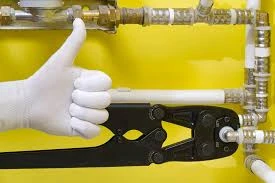PEX Pipe BS 15875 installations have long been a staple in modern plumbing systems due to their flexibility and ease of use. However, like any technology, the methods and tools for installing PEX pipes are continuously evolving. The latest innovations offer faster, more accurate installations, improving both efficiency and quality. This article delves into these new options, with a specific focus on how they align with BS 15875 standards, ensuring that your PEX installations are both compliant and top-notch.
What is PEX Pipe?
PEX, or cross-linked polyethylene, is a type of plastic tubing used in plumbing and heating systems. Its flexibility allows it to be easily bent and routed through various spaces, reducing the need for joints and fittings. The benefits of PEX pipes include resistance to corrosion, ease of installation, and cost-effectiveness.
Understanding BS 15875 Standards
BS 15875 is a British Standard that outlines the specifications for PEX piping systems. It includes guidelines for materials, installation practices, and testing procedures. Compliance with BS 15875 ensures that PEX installations meet high standards of safety, durability, and performance.
Traditional PEX Pipe Installation Methods
Traditionally, PEX pipe installation involved several manual processes, including measuring, cutting, and fitting pipes. These methods often led to challenges such as inconsistent measurements and lengthy installation times. Accurate installations required skilled labor and could be prone to errors, impacting the overall efficiency and cost.
New Innovations in PEX Pipe Installation
Recent advancements in technology have transformed PEX pipe installation. New tools and techniques now enable faster and more accurate installations. Innovations such as prefabrication, modular systems, and advanced connection systems are revolutionizing the industry.
Faster Installation Techniques
One of the most significant improvements is the shift towards prefabrication and modular systems. Prefabrication allows for large sections of piping to be assembled off-site, reducing on-site labor and installation time. Modular systems further streamline the process by offering pre-assembled components that fit together seamlessly.
More Accurate Installation Methods
Accuracy has also seen significant enhancements. Modern measuring and cutting tools are designed to ensure precise dimensions, reducing the likelihood of errors. Precision equipment, such as advanced crimping tools and laser-guided systems, also contributes to more accurate installations.
The Role of BS 15875 in New Installation Techniques
BS 15875 plays a crucial role in ensuring that new installation methods adhere to established quality standards. By aligning new techniques with these standards, installers can guarantee that their work meets regulatory requirements and achieves the desired performance levels.

Case Studies of Successful PEX Pipe Installations
Examining real-world examples of successful PEX pipe installations highlights the effectiveness of new methods. Residential and commercial projects showcase how faster and more accurate techniques have been applied, demonstrating the tangible benefits in various settings.
Comparing Old and New Installation Methods
When comparing traditional and modern methods, it’s clear that the new techniques offer significant advantages. Faster installation times and improved accuracy not only enhance efficiency but also reduce overall costs. A detailed cost analysis further emphasizes the benefits of adopting the latest technologies.
Training and Skill Requirements
The shift to new installation methods necessitates additional training for professionals. Understanding and mastering modern techniques requires up-to-date skills and knowledge. Training programs are available to help installers adapt to these changes and improve their proficiency.
Troubleshooting Common Installation Issues
Even with advanced techniques, issues can arise. Common problems include misalignment and connection failures. Knowing how to troubleshoot and address these issues effectively is essential for maintaining high-quality installations.
Future Trends in PEX Pipe Installation
Looking ahead, the industry is likely to see continued innovation. Emerging technologies and trends will further enhance the efficiency and accuracy of PEX pipe installations. Staying informed about these developments will be crucial for professionals aiming to remain at the forefront of the industry.
Conclusion
The advancements in PEX Pipe BS 15875 installation methods represent a significant leap forward in the industry. Faster and more accurate techniques, coupled with adherence to BS 15875 standards, ensure high-quality results. As technology continues to evolve, staying updated on the latest trends and innovations will be key to maintaining excellence in PEX pipe installations.
FAQs
- What are the main advantages of PEX pipes?
PEX pipes offer flexibility, resistance to corrosion, ease of installation, and cost-effectiveness. - How does BS 15875 affect PEX pipe installations?
BS 15875 provides guidelines and standards that ensure the quality and safety of PEX pipe installations. - What are the new techniques for faster PEX pipe installations?
New techniques include prefabrication, modular systems, and advanced connection systems. - How can I ensure accurate PEX pipe installations?
Use modern measuring and cutting tools, and precision equipment. Adhering to BS 15875 standards also helps. - What training is available for modern PEX pipe installation methods?
Training programs are available to help professionals learn and adapt to new techniques and technologies.